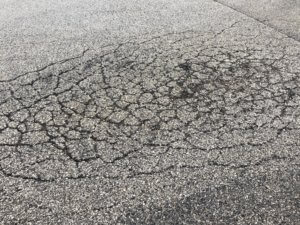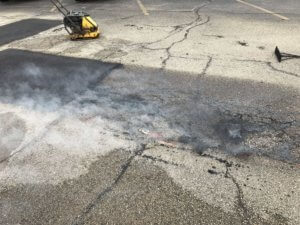
Alligators are invading parking lots across central Illinois. Well, maybe not the actual reptile, but alligator cracks certainly are a common asphalt problem.
What are alligator cracks?
Alligator cracks (also known as “crocodile cracks”) are interconnecting or interlaced cracking patterns in the asphalt seal layer. The cracks resemble the hide of an alligator.
The unique pattern typically starts with longitudinal cracks, which are then connected by transverse cracks creating interconnected geometric “cell” shapes.
While the interlaced “cell” pattern of an alligator hide might make a fashionable design for handbags or shoes, it’s a sign of trouble in your parking lot.

How are they formed?
Alligator cracks can be caused by sub-base failure, poor drainage or repeated over-loading of your asphalt.
One of the most common causes is poor drainage. The freezing-thawing cycle common in Illinois can weaken an asphalt base, leading to cracking.
Asphalt is designed with a certain amount of flexibility. The flexibility allows it to “give” under the weight of traffic or vehicles. For peak performance, the surface must have a strong and stable foundation.
Cracks allow water to seep underneath the asphalt and destabilize the foundation. A weakened foundation is ripe ground for more cracks to develop.
The weakened, cracked foundation, coupled with the weight of traffic, can cause the alligator pattern to emerge.
What can be done?
The ultimate way to say “see ya later, gator” to alligator cracks is to contact the experts at 309 Paving Services.
They can evaluate the installation of the sub-base and modify it appropriately to eliminate the problems causing alligator cracking.

Asphalt patching involves the removal and replacement of deteriorated sections of a parking lot pavement surface.
Using a saw, the deteriorated section is cut out of the pavement surface. The base is evaluated and improved if needed before new asphalt is applied to blend with the look of the original surface.
309 Paving Services experts can determine if asphalt patching is enough, or if you need a complete re-pour.
The hot rubber crack filling process is used to prevent further alligator cracking.
Cracking occurs when water penetrates and deteriorates the base of an asphalt surface, rubber is melted and poured into the asphalt cracks. The hot rubber adheres to the asphalt and prevents water from penetrating to the base.
Call 309 Paving Services to chomp down on your parking lot’s alligator cracking.


